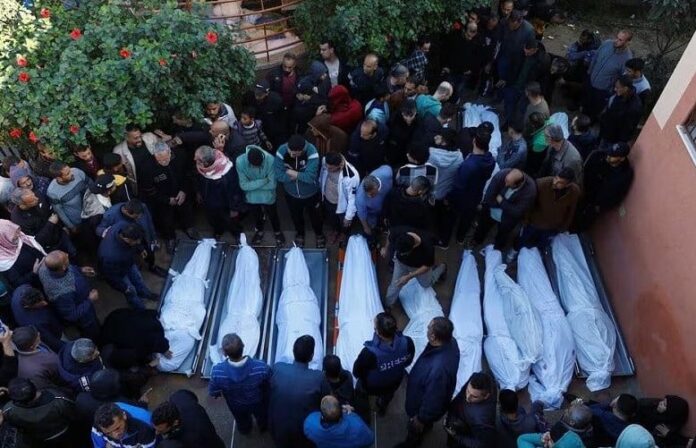Spokesman for Hamas’s Al Qassam Brigades has said that Israeli captives will not be released by military force
News Desk
GAZA: As the US-backed Israeli genocidal war on the Gaza Strip entered day 65 on Sunday, massive aerial and artillery strikes continued to pound and level whole blocks and homes and massacre more civilians, mostly children and women.
According to local sources, the Israeli occupation army carried out hundreds of aerial and artillery attacks last night and in the morning on different areas of Gaza.
Dozens of casualties were reported after an Israeli airstrike destroyed a house in Jabalia refugee camp, north of Gaza.
The Red Crescent said its ambulance crews evacuated 11 seriously wounded civilians from the Ahli Baptist Hospital in Gaza to the south, adding that one of the wounded died after the Israeli forces obstructed the movement of the convoy.
Four civilians, including one with special needs, were martyred during Israeli attacks on different areas of Khan Yunis.
The health ministry said that the director general of its pharmacy department was injured by Israeli sniper fire as he was trying to reach medicine warehouses in Gaza City.
Dozens of civilians were also killed or injured during Israeli attacks on different areas.
In a pre-recorded message, the spokesman for Hamas’s Al Qassam Brigades has said that Israeli captives will not be released by military force.
“We tell Israelis that Netanyahu, Gallant and others in the war cabinet cannot bring back their captives without negotiations. The latest killing of a captive that they tried to take back by force proves that.”
The spokesman for the group’s armed wing was referring to an Israeli man held captive, whom Israeli special forces in the Gaza Strip tried to rescue. Al Qassam, Abu Obaida said, repelled their attempt, inflicting several military casualties, and that the captive also died in the incident.
Abu Obaida also said that in ten days fighters from Beit Hanoun to Khan Younis “managed to destroy more than 180 military vehicles APCs, tanks and bulldozers partially and totally. Our fighters carried out operations that included attacking foot soldiers from zero distance, and carried out tens of sniper attacks and used anti-personnel weaponry.”
“These led to a large number of deaths and injuries among the enemy ranks,” he said, adding:
Al Qassam also struck several Israeli cities, including Ashkelon, Ashdod and others.
We continue to push back against the Israeli aggression.
The enemy’s only claim to victory is its attacks on civilians and civilian infrastructure
Israel’s talk of crushing Hamas is for public consumption.
We urge people in the Arab world and Islamic world to protest and not to be bystanders.
Thousands of our fighters remain steadfast and are waiting for a chance to fight.
The Director-General of the World Health Organization, Tedros Adhanom Ghebreyesus, stated on Sunday that the health sector in Gaza is facing “catastrophic” consequences due to the Israeli war. Meanwhile, a UN official confirmed that half of Gaza’s population is starving, and 9 out of 10 people do not have enough food to eat daily.
During an exceptional session of the WHO Executive Board to discuss the repercussions of the Israeli war on Gaza, Ghebreyesus stated that the “impact of the conflict on health is catastrophic,” emphasizing that healthcare workers are performing impossible tasks in difficult conditions.
He pointed out that overcrowding and shortages in Gaza create “ideal conditions” for the spread of diseases, stating, “In short, the health needs have increased significantly, while the capacity of the health system has decreased to one-third of what it used to be.”
In response, Karl Skau, Deputy Executive Director of the United Nations World Food Program, said, “Half of the population is starving, and 9 out of 10 people do not eat every day. It is evident that the needs are enormous.” He further added in his statement to Reuters, “The situation inside Gaza has become increasingly chaotic. There is a question of how long this can continue because the humanitarian operation is collapsing.” Regional Director of the World Food Program, Corinne Fleischer, considered that “the only way to avert the risk of famine in Gaza is to cease-fire to allow for widespread access to food.” In a post on the WFP’s X platform, Fleischer stated during her visit to Gaza, “I have worked in emergency situations for 20 years, but nothing compares to what I have seen, heard, or felt in Gaza today,” noting that “Gazans face despair, fear, hunger, and the risk of famine.”
The Russian foreign minister says it is unacceptable that Israel is using Hamas’s October 7 offensive as justification for a collective punishment of Palestinians in Gaza and has called for international monitoring of the situation on the ground in the besieged enclave.
Lavrov said there needs to be “humanitarian pauses” in Gaza and “some kind of monitoring on the ground”.
“We addressed the Secretary-General [Antonio Guterres] suggesting that he use his authority to consider some kind of monitoring – but so far to no avail,” Lavrov said.

















